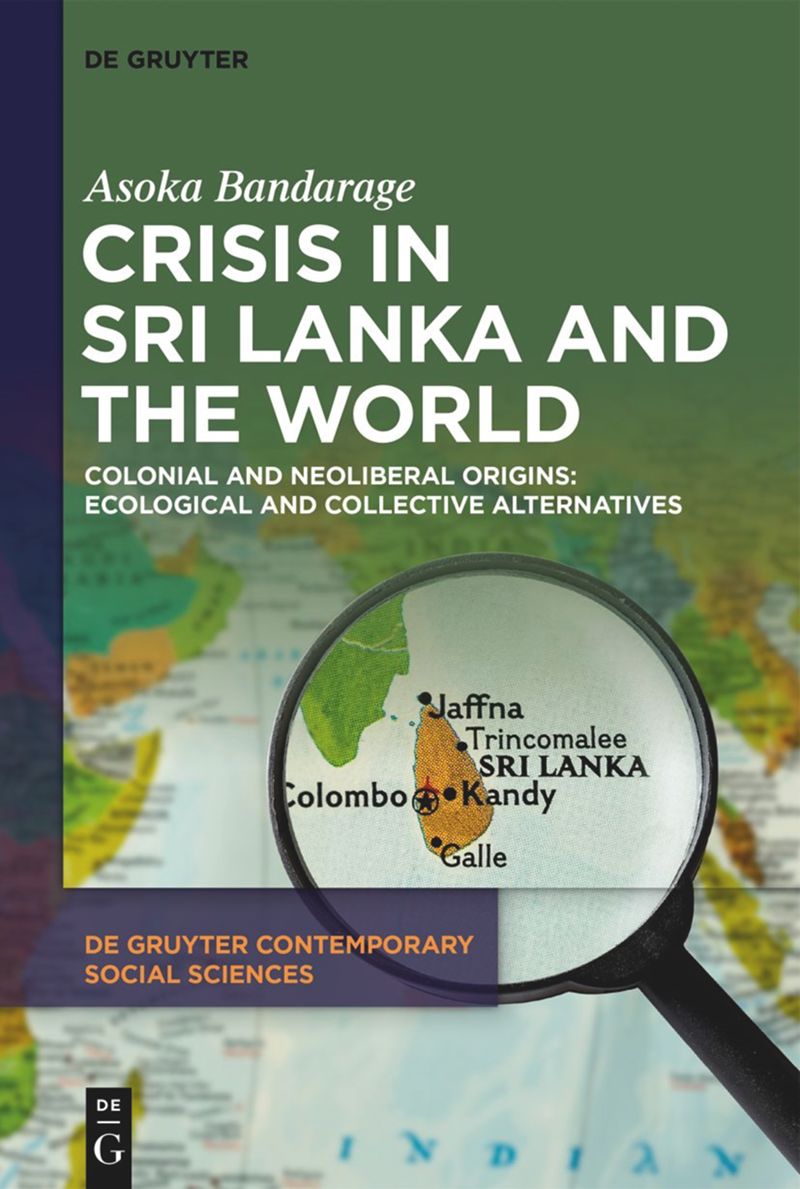Crisis in Sri Lanka and the World: Colonial and Neoliberal Origins: Ecological and Collective Alternatives by Asoka Bandarage
Hardback – De Gruyter, May 22, 2023. ISBN 9783111203430. Also available as ebook.

20% discount at degruyter.com until end of 2023!
This book provides a broad picture of Sri Lanka’s on-going political and economic crisis as the culmination of several centuries of colonial and neo-colonial developments. The book presents the Sri Lankan crisis as an exemplification of a broader global existential crisis facing more and more debt trapped countries, especially in the post-colonial Global South. The book’s in-depth case study raises important questions pertaining to sovereignty and political and economic democracy in Sri Lanka and the world at large.
The book also explores the emergence of the crisis in the context of the accelerating geopolitical conflict between China and the USA in the Indian Ocean. It ponders if the debt crisis, economic collapse and political destabilization in Sri Lanka were intentionally precipitated to the advantage of the Quadrilateral Alliance (USA, India, Australia and Japan).
Moving beyond geopolitical rivalry, the book juxtaposes Sri Lanka’s political-economic crisis with the broader ecological crisis of climate change and sea-level rise.
The book concludes with a consideration of the ethical dilemmas behind the debt and survival crisis in Sri Lanka and across the world. It points out a range of social movements and initiatives in Sri Lanka and the Global South which subscribe to collective and ecological alternatives and a Middle Path of sustainability and social justice.
- Timely and well-researched
- A global perspective on the Sri Lankan crisis
- Offers ecological and collective alternatives as crisis resolution
Press info
Please click here to download a press one-sheet, and a high resolution cover image is available here. Contact vimuktipublishing@gmail.com for more information.
Reviews
“In this well-written, well-researched scholarly text, Asoka Bandarage brilliantly combines a detailed historical analysis of the political and economic crisis in Sri Lanka and a global ethical perspective pertaining to similar crises elsewhere in the world.”
T. Lalithasiri Gunaruwan, Professor, Department of Economics, University of Colombo, Sri Lanka
“A very useful analysis providing depth and background to understanding the current Sri Lankan economic crisis. Bandarage goes well beyond the standard tropes of ‘policy errors’ or culture/identity-based explanations, to locate the Sri Lankan experience in the wider context of profit-, technology- and finance-driven globalization.”
Jayati Ghosh, Professor of Economics, University of Massachusetts Amherst, USA
“Crisis in Sri Lanka and the World is a most timely book – and urgently needed for the world that is at a critical crossroads of extreme and accelerating possibilities. For alternatives that are just and sustainable, the crisis needs to be understood both historically as well as in the contemporary context. I cannot think of very many who can do that – both with scholarship and passion – with a fusion of global as well as local and holistic perspectives as Asoka Bandarage has been able to do here.”
Sajed Kamal has taught at Boston University, Northeastern University, Antioch New England Graduate School, and Brandeis University
“A powerful, riveting and in-depth analysis of the structural and destructive legacy of colonialism on post-colonial and debt-trapped countries like Sri Lanka … Dr. Bandarage’s superb book is well-researched, expertly synthesized and presented with rigor in an engaging and accessible writing style. It is a tremendous achievement and a must-read for every scholar and student of history, colonialism, underdevelopment, hegemonic domination and ecological disasters. Its cutting-edge scholarship is of critical importance in the fields of economics, political science, environmental studies and policy coordination at the national and international level.”
Filomina C. Steady, Professor Emerita, Anthropology and Africana Studies, Wellesley College, USA
